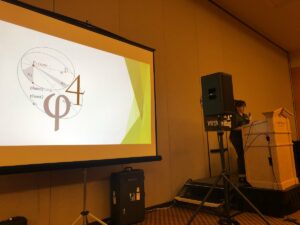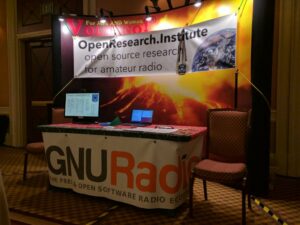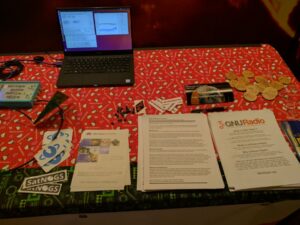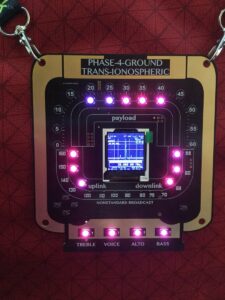A Sizzling Summer Summary prepared just for you!
Read on for highlights from all our technical and regulatory open source digital radio work. ORI’s work directly benefits amateur radio, provides educational and professional development opportunities for people all over the world, and puts ethics and good governance first.
Opulent Voice Flying High
Opulent Voice is an open source high bitrate digital voice (and data) protocol. It’s what we are using for our native digital uplink protocol for ORI’s broadband microwave digital satellite transponder project. Opulent Voice has excellent voice quality, putting it in a completely different category than low bitrate digital communications products such as D-Star, Yaesu System Fusion, and DMR.
Opulent voice switches between high resolution voice and data without requiring the operator to switch to a separate packet mode. Opulent voice also handles keyboard chat and digital file transmission. Seamless integration of different data types, using modern digital communication techniques, differentiates Opulent Voice from any other amateur radio protocol.
Opulent Voice will fly on the University of Puerto Rico’s RockSat-X launch on 13 August 2024. It’s been a very positive experience working with the students and faculty at the University.
An implementation on FPGA for the PLUTO SDR is well underway, with a active international team delivering quality results. This implementation will not only turn your PLUTO SDR into an Opulent Voice transceiver, but it will have remote operation functionality.
Hear what Opulent Voice sounds like by following the links in an earlier update at https://www.openresearch.institute/2022/07/30/opulent-voice-digital-voice-and-data-protocol-update/
We’ve come quite a long way in less than two years! The FPGA implementation upgrades the modulation from 4-ary frequency shift keying to minimum shift keying, and increases forward error correction performance and flexibility.
HAMCON:ZION 2024 is This Week!
Please visit us at HAMCON:ZION 2024 this weekend, 12-13 July 2024 in St. George, Utah, USA.
The event website is https://www.hamconzion.com/
ORI will have a club booth at the event. We opened our space to QRZ.com (https://www.qrz.com/) and Deep Space Exploration Society (https://dses.science/). This combined exhibit is a one-stop shop for the best in community, technical, and citizen science amateur radio activity.
We have a volunteer presenting on Artificial Intelligence and Machine Learning in Amateur Radio. The talk opens with a brief summary of the history of our relationship with created intelligence and then explores case studies of the use of artificial intelligence and machine learning in amateur radio. Talk is 1pm on Friday in Entrada B.
Open Research Institute at DEFCON32
We will present an Open Source Showcase at DEFCON in the Radio Frequency Village 12-13 August 2024, with accessible exhibits and demonstrations. Here is the list of scheduled project demonstrations.
Regulatory Efforts: ORI works hard for open source digital radio work and moves technology from proprietary and controlled to open and free in intelligent and mutually beneficial ways. Our work on ITAR, EAR, Debris Mitigation, AI/ML, and Synthetic Aperture Radar will be presented and explained. Find out more at https://github.com/OpenResearchInstitute/documents/tree/master/Regulatory
Ribbit: this open source communications protocol uses the highest performance error correction and modern techniques to turn any analog radio into a digital text terminal. No wires, no extra equipment.. Learn how to use this communications system and get involved in building a truly innovative open source tactical radio service. Find out more at https://www.ribbitradio.org
Satellite: ORI has the world’s first and only open source HEO/GEO communications satellite project. All working parts of the transponder project will be demonstrated, from Opulent Voice to antenna designs.
The Dumbbell antenna: We have an HF antenna design based on a highly effective inductive loading technique first written about in 1958. Learn about this antenna and find out how to make your own. Repository can be found at https://github.com/OpenResearchInstitute/dumbbell
RFBitBanger: an HF QRP system and novel digital protocol called SCAMP. Kit information and updates will be available. Get your Batch 2 kit today at https://www.ebay.com/itm/364783754396
Radar: Our regulatory and technical work in synthetic aperture radar will be demonstrated. One of our volunteers will be giving a talk about open source synthetic aperture radar in the RF Village speakers track. Here is the abstract.
Synthetic Aperture Radar (SAR) is one of the most useful and interesting techniques in radar, providing high resolution radar satellite images from relatively small satellites. SAR is not limited by the time of day or by atmospheric conditions. It complements satellite photography and other remote sensing techniques, revealing activity on the Earth that would otherwise be hidden. How does the magic happen? This talk will explain the basics of SAR in an accessible and friendly way. That’s the good news.
The bad news? SAR is controlled by ITAR, the International Traffic in Arms Regulations, and is listed in the USML, the United States Munitions List. ITAR regulates the export of defense articles and services and is administered by the US State Department. This includes both products and services as well as technical data. Such as, catalogs of high resolution radar imagary. The articles and services regulated by ITAR are identified in the USML. If ITAR doesn’t get you, then EAR just might. The Export Administration Regulations (EAR) are administered by the US Commerce Department, and items are listed on a Commerce Control List (CCL). Commercial products and services and dual-use items that are not subject to ITAR could be regulated by EAR. Even if you are free of ITAR and EAR, you may still be regulated by yet another agency, such as the FCC.
Regulation of SAR chills commercial activity, creating costly and time-consuming burdens. But why does any of this matter to signals hackers? Because technology has overtaken the rules, and devices used by enthusiasts, researchers, students, and hackers are increasingly likely to have enough capability to fall into export-controlled categories. The penalties are harsh. Fear of running afoul of ITAR is enough to stop a promising open source project in its tracks.
Is there a way forward? Yes. ITAR has a public domain carve out. Information that is published and that is generally accessible or available to the public is excluded from control as ITAR technical data. That’s great in theory, but how can we increase our confidence that we are interpreting these rules correctly? How can we use and build upon these rules, so that our community can learn and practice modern radio techniques with reduced fear and risk? Can we contribute towards regulatory relief when it comes to SAR? We will describe the process, report on the progress, and enumerate the challenges and roadblocks.
RFBitBanger Batch 2 Kits Available
Kits are available at our eBay store at this link https://www.ebay.com/itm/364783754396
Be a part of the future with a prototype Batch 2 kit build of the RFBitBanger, a low-power high-frequency digital radio by Dr. Daniel Marks KW4TI. Presented by Open Research Institute, this kit is designed to produce 4 watts of power and opens up a new digital protocol called SCAMP.
SCAMP Is now available in FLDigi!
Source code and extensive instructions can be found at https://github.com/profdc9/fldigi
Your donation in exchange for this kit directly enables the further development of an innovative Class E amplifier based radio design. It has a display, button menu navigation, and keyboard connection for keyboard modes and keyboard-enabled navigation. This radio can be taken portable or used in a case. If you have a 3d printer, then Dr. Marks has a design ready for you to print in the repository linked below.
- Built-in digital modes: CW, RTTY, SCAMP (FSK and OOK, multiple speeds)
- Key jack supports straight keys and iambic paddles
- Open Source hardware and firmware, Arduino UNO compatible https://github.com/profdc9/RFBitBanger
- External sound-card FSK digital modes supported (including FT4/FT8)
- Experimental SSB support
- Serial port support (2400 baud) for send and receive in keyboard modes
SCAMP is a new protocol that allows keyboard-to-keyboard contacts with a digital protocol that has excellent connection performance. See Dr. Marks presentation about RFBitBanger at QSO Today Academy in September 2023 to learn more about SCAMP and the RFBitBanger project. Link below:
All surface mount parts on the main board are pre-installed at the factory. All the through-hole parts you need to complete the radio are provided for you to solder yourself.
Builder’s notes and photos of all the components to help you identify and install them can be found here:
https://github.com/OpenResearchInstitute/RFBitBanger-kit/tree/main/batch2
If you don’t know how to wind toroids or solder surface mount capacitors, this is an excellent kit to learn on. There are just six toroids on the main board, and two on each band pass filter board. You can build just one band pass filter board and operate on a single band, or you can build an assortment. We provide 12 filter boards, enough toroids to build any 9 filters, and a supply of capacitors that will let you build those 9 filters for 9 different HF ham bands. These capacitors are size 1206, which is the largest common size for SMT capacitors and the easiest to solder manually. All you’ll need is a pair of tweezers and your regular soldering iron and solder. We provide detailed instructions on winding the toroids and soldering the capacitors. You get spare filter boards to experiment with.
Friendly Support is provided through a dedicated Open Research Institute Slack channel.
Instructions on how to join this community are here:
https://www.facebook.com/openresearchinstitute https://www.instagram.com/open_research_institute/
https://x.com/OpenResearchIns



